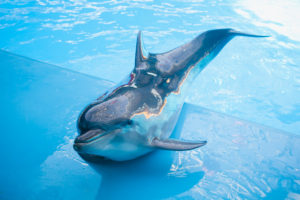Ric O’Barry: ‘Holanda, fecha o aquário dos golfinhos!’
Ric O’Barry apelou à Holanda para se livrar de golfinários. O antigo treinador de Flipper e figura de proa na protecção de golfinhos fez seu apelo durante uma conversa com a Câmara Baixa. O’Barry acha que manter golfinhos em cativeiro é hostil aos animais e uma forma de educação errada.

A convite dos parlamentares Frank Wassenberg (Partido para os Animais) e Rudmer Heerema (VVD: Partido Popular para Liberdade e Democracia) o protector de golfinhos Ric O’Barry falou sobre o golfinário com a Câmara Baixa na quarta-feira dia 8 de junho. O’Barry que após ter trabalhado alguns anos com golfinhos decidiu dedicar sua vida à liberação e protecção de animais marinhos inteligentes, afirma que os aquários dos golfinhos são circos mascarados ruins para o bem-estar animal e propagadores de uma mensagem errada às crianças. Eles fazem as crianças acreditar que é aceitável manter animais presos e dominá-los.
O’Barry argumenta que é fundamental na vida de seres humanos e de animais poder tomar decisões próprias. Isso está em desacordo com a vida de golfinhos em cativeiro que decorre num tanque de concreto. Em tal tanque os golfinhos não podem exercer seu comportamento normal. O’Barry também afirma que golfinhos num golfinário não conseguem comunicar bem entre si porque o som de seu sonar é reflectido no tanque de concreto. Por isso o O’Barry faz um apelo à Holanda – ‘um dos países mais progressivos no mundo’ – para dar o bom exemplo ao mundo e fechar o aquário dos golfinhos. Todos na Holanda podem ajudar por não comprar bilhetes para os espectáculos dos golfinhos. O Partido para os Animais apoia calorosamente o apelo de O’Barry.
Flipper
Nos anos ’60 Ric O’Barry capturou cinco golfinhos selvagens e os treinou para o popular seriado de televisão Flipper. O contacto com estes animais sociais e inteligentes mudou o entendimento de O’Barry. Desde os anos ’70 ele se empenha em alcançar o maior número possível de pessoas com sua mensagem sobre os efeitos negativos de cativeiro nos golfinhos.
Ric O’Barry has called on the Dutch Parliament to close the Dolphinarium in the Netherlands. The global figurehead of dolphin protection and former trainer of the famous dolphin Flipper made his appeal during a meeting of the Dutch Lower House. O’Barry believes dolphin captivity to be animal-unfriendly and he feels that it sends the wrong message to our children.

At the invitation of MPs Frank Wassenberg (Party for the Animals) and Rudmer Heerema (VVD), dolphin protector Ric O’Barry has addressed the Dutch Lower House on the subject of the dolphinarium on Wednesday 8 June. O’Barry, who had worked with dolphins for a few years before deciding to dedicate his life to the freeing and protecting of intelligent marine animals, claims that dolphinariums are disguised circuses that are bad for animal welfare and send the wrong message to our children: they are taught that the captivity and domination of animals is acceptable.
O’Barry argues that the lives of both humans and animals are about making one’s own decisions. This is at odds with the lives of dolphins in captivity, which are spent entirely inside a concrete container. In this container, dolphins are unable to express normal patterns of behaviour. O’Barry also states that communication is very difficult for dolphins in a dolphinarium, as the sound of their sonar reverberates in the concrete container. That is why O’Barry has called on the Netherlands – “one of the most progressive countries in the world” – to set an example for the world by closing the Dolphinarium. Everyone in the Netherlands can contribute by not buying a ticket to a dolphin show. The Party for the Animals strongly supports O’Barry’s appeal.
Flipper
In the sixties, Ric O’Barry caught five dolphins from the wild, and trained them for his popular TV show Flipper. However, his contact with these social and intelligent animals made him change his mind, and since the seventies, O’Barry has dedicated himself to reaching as many people as possible about the adverse effects of dolphin captivity.